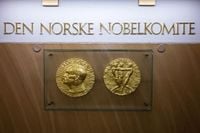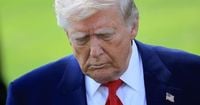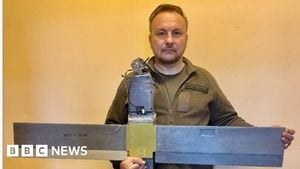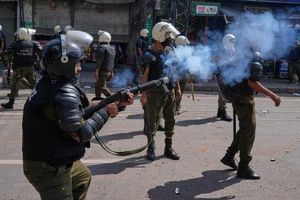The Nobel Peace Prize, one of the world’s most coveted honors, was thrust into the spotlight on October 10, 2025, when the Norwegian Nobel Committee announced its latest laureate: Venezuelan opposition leader María Corina Machado. The decision, which came amid swirling speculation and dramatic world events, bypassed U.S. President Donald Trump, whose supporters and critics alike had watched the process with bated breath.
This year’s Peace Prize was awarded “for her tireless work promoting democratic rights for the people of Venezuela and for her struggle to achieve a just and peaceful transition from dictatorship to democracy,” as the Committee stated in Oslo. Machado’s recognition comes at a time when Venezuela remains mired in political turmoil, with President Nicolás Maduro’s administration accused of widespread electoral fraud and human rights abuses. International observers, including the Carter Center, have repeatedly questioned the legitimacy of Venezuela’s recent elections, with independent monitors reporting that opposition candidate Edmundo González had won a clear victory—only for Maduro to declare himself the winner once again.
Machado, who has lived in hiding for over a year due to threats from the Maduro regime, reacted with disbelief to the news. “I’m in shock!” she reportedly exclaimed during a phone call with González, who is currently in exile. In a public statement, Machado dedicated the prize “to the suffering people of Venezuela and to President Trump for his decisive support of our cause.” She emphasized her gratitude to the American public, Latin American nations, and global democracies, calling the recognition “a boost to conclude our task: to conquer Freedom.”
The Nobel Committee’s decision was not without controversy, especially given the political backdrop. Trump, who began his second term in January 2025, had waged a relentless campaign for the prize. He claimed to have “solved eight wars in a period of nine months,” a statement he made during an Oval Office meeting with Finland’s president. Trump’s bid was buoyed by several governments submitting nominations on his behalf, many seen as seeking to curry favor with Washington.
Despite the intense campaign, the Committee’s rules proved decisive: the deadline for nominations was January 31, just days after Trump’s return to the White House. Most of the diplomatic achievements Trump touted—including a landmark ceasefire between Israel and Hamas—occurred after this cutoff. As such, the Committee’s final deliberations took place before the ceasefire was officially confirmed, making Trump’s late-breaking accomplishments ineligible for consideration.
The timing of the announcement added to the drama. As the Nobel Committee revealed its decision, news broke that Israel had approved a Trump-brokered ceasefire plan to end the devastating Gaza war. The agreement, which included the release of hostages and a phased withdrawal of Israeli forces, was hailed as a potential turning point in the Middle East. Celebrations erupted in Tel Aviv and Jerusalem, while in Gaza, the mood was one of cautious relief amid profound loss. Trump’s supporters argued that the Nobel Committee had overlooked a historic achievement, with White House Communications Director Steven Cheung stating, “He has the heart of a humanitarian, and there will never be anyone like him who can move mountains with the sheer force of his will. The Nobel Committee proved they place politics over peace.”
Trump himself maintained a defiant stance, telling reporters, “I’ve stopped eight wars, so that’s never happened before—but they’ll have to do what they do. Whatever they do is fine. I know this: I didn’t do it for that, I did it because I saved a lot of lives.” Yet, frustration simmered among his base. Influential voices on social media dismissed the winner as “some random person that nobody knows,” with one account declaring, “THE NOBEL PEACE PRIZE IS A JOKE.”
Machado’s Nobel win also spotlighted Venezuela’s deepening crisis. The U.N. Security Council convened the same day to discuss U.S.-Venezuela tensions, a session organized by Russia and China at Venezuela’s request. The meeting underscored the international dimensions of Machado’s recognition, as her advocacy has drawn both praise and ire across the geopolitical spectrum. The United States, European Parliament, and United Kingdom have all formally recognized González as Venezuela’s legitimate president, while the Maduro administration has responded with charges of “treason” against Machado and other opposition figures.
International leaders were quick to applaud Machado. The UN Human Rights Office called the award a reflection of Venezuela’s aspirations for democracy and rule of law. EU Commission President Ursula von der Leyen described it as a tribute to Machado’s courage and “every voice that refuses to be silenced.” U.S. Senator Rick Scott lauded her as a “hero” and steadfast advocate for democracy, while Secretary of State Marco Rubio, who had previously championed her nomination, called her “the personification of resilience, tenacity, and patriotism.”
Yet, the prize also brings risks. Experts warn that in autocratic contexts like Venezuela, the Nobel Peace Prize can sometimes intensify repression rather than enable change. Machado joins a lineage of laureates—including Liu Xiaobo and Narges Mohammadi—who have faced imprisonment or threats after their recognition. Still, the prize offers a powerful symbol of solidarity for those fighting for democracy worldwide.
The Nobel Committee, for its part, sought to distance itself from the political maelstrom. Chair Jørgen Watne Frydnes reiterated that “we base only our decision on the work and the will of Alfred Nobel.” A spokesperson added, “This committee sits in a room filled with the portraits of all laureates, and that room is filled with both courage and integrity.” The Committee is also investigating a possible leak after unusual betting activity on Polymarket, a popular online prediction platform, saw Machado’s odds surge hours before the official announcement.
Trump’s loss has reignited debate over the Peace Prize’s purpose and process. Some argue that the Committee’s strict adherence to nomination deadlines and Nobel’s original intent—“to the person who shall have done the most or the best work for fraternity between the nations and the abolition or reduction of standing armies and the formation and spreading of peace congresses”—ensures the prize’s integrity. Others, particularly Trump’s supporters, see it as an example of political bias or missed opportunity.
Looking ahead, Trump’s allies in Congress have announced plans to introduce a resolution “to honor [Trump] with the Nobel Peace Prize,” though the Committee alone decides the recipient. Meanwhile, speculation has already begun about Trump’s chances in 2026, especially if the Middle East peace deal holds and further diplomatic breakthroughs are achieved.
For now, the spotlight remains on María Corina Machado, whose courage and commitment have brought Venezuela’s struggle to the world stage. Her Nobel Peace Prize is a testament to the enduring power of civilian resistance—and a reminder that, even amid controversy, the pursuit of peace and democracy commands global attention.





